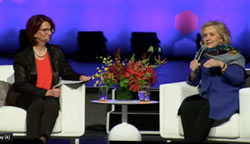Julia Gillard* says women still have to work twice as hard as less competent men to succeed.
 It’s long been said that for a woman to get half as much credit as a man, she has to work twice as hard and be twice as smart.
It’s long been said that for a woman to get half as much credit as a man, she has to work twice as hard and be twice as smart.
As someone who’s familiar with being more qualified, competent and dedicated than her male peers, Hillary Clinton knows a great deal about this.
The good news is that research to support King’s College London’s World Questions events series (which I kicked off with Clinton last week; pictured), reveals the public now recognise that women often have to be better and brighter than their male counterparts to reach similar heights – and that men tend to have other advantages that are bigger factors in their success.
The study, by the Global Institute for Women’s Leadership, the Policy Institute and Ipsos Mori, finds that 26 per cent of Britons think intelligence is one of the most important factors in helping women get ahead, compared with 17 per cent who say the same for men.
But even then, intelligence will only get you so far: for example, women in England with postgraduate degrees are still paid less than men with only bachelor degrees.
What’s more, it seems people recognise that women are more likely to have to earn what’s given to them, putting in more time and effort than men to get similar rewards: 37 per cent say working hard is key for women’s success, versus 29 per cent for men.
This could be a sign of a growing awareness that, for most women, the working day doesn’t end when you leave the office.
In the UK, as in Australia, there’s a stark divide in unpaid labour among heterosexual couples, even where both partners work full-time.
According to one estimate, based on 2015 data, full-time working mothers spend double the amount of time on physical childcare that full-time working fathers do each day.
Meanwhile, the public is also aware that social capital – the range and quality of one’s social network – is a trump card that men have over women.
Some 29 per cent of Britons say having connections is important for men’s success – almost double the 15 per cent who say the same for women.
The power of the old boys’ network is not lost on the public: for women, it’s what you know; for men, it’s still who you know.
And as any woman who’s been leered at or received unwanted comments on her appearance will recognise, it’s also about how you look.
One in 10 Britons say good looks are a key factor in helping women get ahead, while just 4 per cent say the same for men.
The depressing reality is that if women want to be seen as just as competent as men, they not only have to be better, they have to look better too.
Previous research has found that women who are judged to be unattractive or unfeminine are evaluated more negatively than similarly unattractive men.
You might have hoped we’d reached a point where a person’s appearance isn’t deemed relevant to their suitability for a job, but recent reports revealed that last year a consulting firm trained young female employees on the need to be “polished” and have a “good haircut, manicured nails [and] well-cut attire that complements your body type” in order to progress in their careers.
So how can we level the playing field so that women are not judged by higher standards and expected to do more and be better than men?
The public thinks the world of work would be a good place to start.
Employers get most of the blame for the persistent gender inequality in society, according to this research.
In the public’s view, the top three barriers to women’s success are employers not doing enough to close the gender pay gap (27 per cent), a lack of employer support for women in balancing work and care responsibilities (22 per cent) and employers not promoting women to senior positions (21 per cent).
The latest academic research agrees that, in more advanced economies, the workplace is one of the final frontiers for gender equality.
According to economist Claudia Goldin, an end to long-hours culture and a growth in flexible working arrangements would have seismic effects on gender relations.
Beyond employment issues, unfair media portrayals of women are seen as the next biggest cause of inequality between men and women.
In fact, 16 per cent of the British public say this is a key factor – the highest of all 27 countries surveyed and significantly higher than the global average of 9 per cent.
So, it’s certainly a good thing that the UK is cracking down on pernicious gender stereotypes on TV.
Make no mistake, we’ve made a great deal of progress on equality between women and men.
But there’s still a long way to go before capable, competent women get the same rewards as their less-than-stellar male counterparts.
Just ask Hillary Clinton.
* Julia Gillard is former Prime Minister of Australia and Chair of the Global Institute for Women’s Leadership at King’s College London. She tweets at @JuliaGillard.
This article first appeared at www.independent.co.uk











